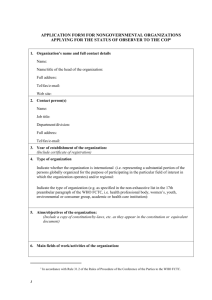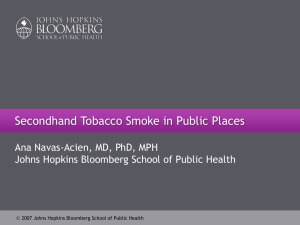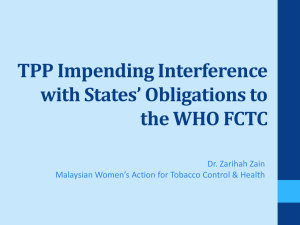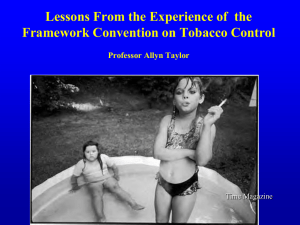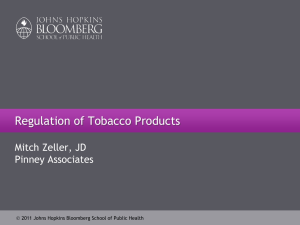PowerPoint Presentation - Global Tobacco Control
advertisement
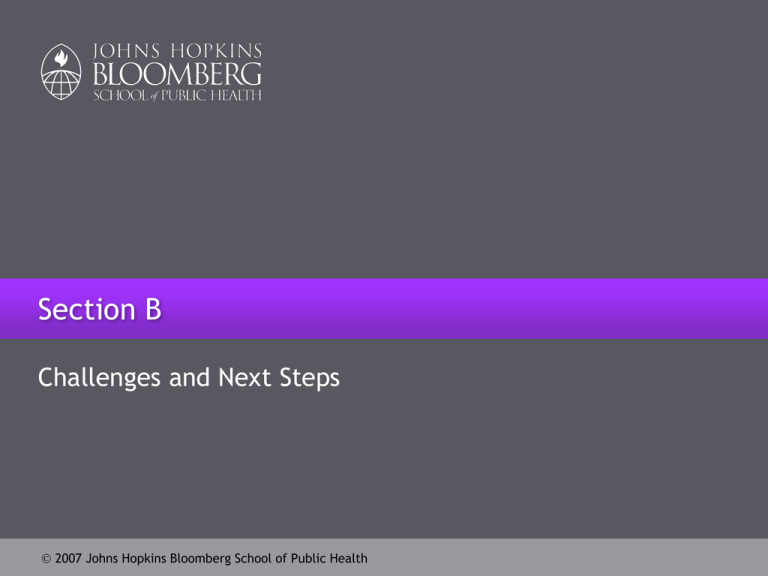
Section B Challenges and Next Steps 2007 Johns Hopkins Bloomberg School of Public Health Support/Monitor Implementation of FCTC Support and monitor the implementation of the FCTC at the national level Play a lead role in policy formulation and advocacy for further development of the FCTC Hold governments accountable to their FCTC obligations Ensure that countries go beyond the minimum FCTC requirements by adopting, implementing, and enforcing effective, evidencebased laws and policies Build regional, sub-regional, and national capacity by supporting civil society in its efforts to achieve ratification, implementation, and monitoring of the FCTC 2007 Johns Hopkins Bloomberg School of Public Health 2 NGOs Will Continue To: Push countries to become parties to the FCTC Assist governments in the process of implementation Use and disseminate research to advocate for an effective, evidence-based, best-practice implementation of the FCTC Independently monitor FCTC implementation 2007 Johns Hopkins Bloomberg School of Public Health 3 NGOs Will Continue To: Monitor tobacco in the International Standard Organization and other regulatory bodies Fully engage in future COPs, subsidiary bodies, guideline development, and protocol negotiations Carefully monitor the status of tobacco in trade agreements Monitor the tobacco industry 2007 Johns Hopkins Bloomberg School of Public Health 4 Major Work Between Conferences of the Parties Protocol on illicit trade Guidelines on Article 11 Packaging and Labeling of Tobacco Products Guidelines on Article 13 Tobacco Advertising Promotion and Sponsorship Guidelines on Article 9 and 10 Regulation of contents and disclosure 2007 Johns Hopkins Bloomberg School of Public Health 5 Major Work Between Conferences of the Parties Alternative crops Tobacco Free Initiative (TFI) development of policy recommendations on tobacco industry interference, which is expected to be used as the basis for development of guidelines on Article 5.3 Develop detailed briefing papers in advance of key meetings of the FCTC, send representatives to participate at key WHO FCTC meetings, and lobby parties in advance of the COP COP implementation review mechanisms 2007 Johns Hopkins Bloomberg School of Public Health 6 Summary The engagement of civil society in a treaty process is a key aspect of democracy and good governance Civil society played a critical role during the negotiations of the FCTC process by: Working collaboratively with governments Providing educational material and tobacco control expertise Helping to shape the public climate that has provided momentum for the international regulation of the tobacco industry 2007 Johns Hopkins Bloomberg School of Public Health 7 Summary Civil society contributed to the strength of the FCTC during its early stages; it encouraged governments to sign and ratify the treaty Civil society continues to play a critical role in assisting the implementation of the FCTC at the national level It will also monitor the implementation by governments of the obligations to which they have committed “The participation of civil society is essential in achieving the objective of the Convention and its protocols” — FCTC Article 4.7 Source: World Health Organization. (2005). 2007 Johns Hopkins Bloomberg School of Public Health 8 Join the FCA and Help Us Reach . . . . . . “A day when smoking is no longer a sign of personal success and when tobacco no longer is a measure of national wealth or a legitimate commodity in international trade.” — Dr. Al Munzer (2007) www.fctc.org To join: membership@fctc.org 2007 Johns Hopkins Bloomberg School of Public Health 9
